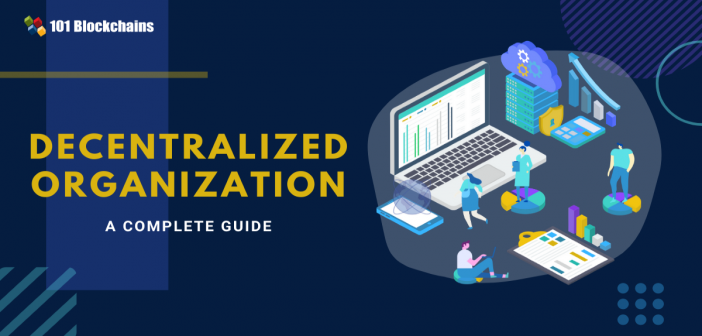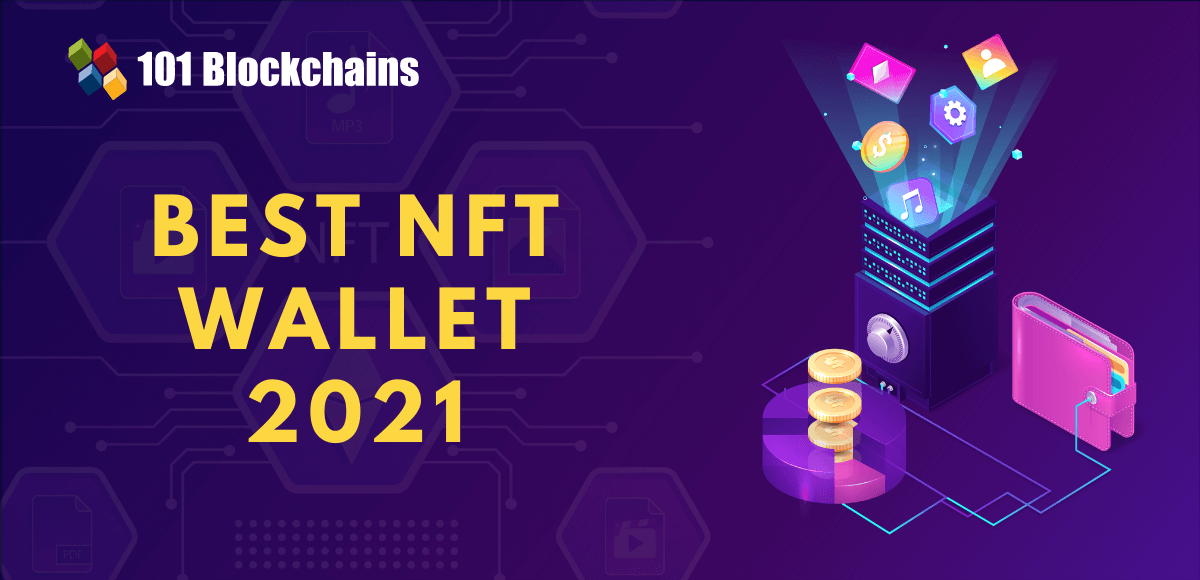Learn how blockchain truly works, master key definitions, and uncover what makes smart contracts so "smart." Dive into the fundamentals, gain valuable insights, and start your blockchain journey today!

Reviews
101 Blockchains
on August 26, 2021
Decentralized Organization: A Complete Guide
Organizations are evolving at a rapid pace. For an organization to become relevant they need to adapt to the market and current standards. Decentralized Organization enables any organization to decentralize its governance and help an organization to evolve beyond the current limitation of a centralized organization.
Right now, any organization can either go centralized or decentralized. Both have their own benefits and disadvantages. But, with time, the primary focus for the organization is now changing to decentralization.
In this article, we will go through a complete guide on a decentralized organization. We will go through decentralization definition, advantages, disadvantages, before moving to a decentralized organization. Next, we will cover decentralized organizations from the blockchain’s point of view, where we cover the Decentralized Autonomous Organization(DAO).
Excited to develop fluent knowledge of the DAO ecosystem? Enroll Now in DAO Fundamentals Course!
What is Decentralization? Decentralized Organization Definition
A decentralized organization is an organization that uses a transparent computer program or platform and electronically predetermined rules to automate decisions and facilitate transactions without any central authority. Decentralization offers an organizational structure where the decision-making delegates to the middle or lower subordinates from the top management.
By doing so, the lowest authority levels can make decisions without the need to worry about top authority levels or a centralized authority. It brings relative autonomy to the whole system where there is no need to revert back and forth for decision making.
The whole organizational structure needs to act more responsibly to make decentralization a success. Apart from that, the top management efficiency also improves as they can now focus on making major decisions rather than dwelling with trivial decision-making that lower-level subordinates make.
Build your identity as a certified blockchain expert with 101 Blockchains’ Blockchain Certifications designed to provide enhanced career prospects.
Decentralized Organization Example
To understand decentralization, let’s go through an example.
In any centralized organization, if an employee wants to take a decision(like buying a table), needs to get its request approved by the central authority. To reach the main decision-maker, the request might have to go through the many subordinates who play their role of either accepting or rejecting the request.
The highest authority finalizes the request, and then only the employee can purchase the table on behalf of the company.
These multiple steps required to take just one decision is time-consuming and hence is not ideal for modern-day organizations and companies.
Please include attribution to staging2.staging2.101blockchains.com with this graphic. <a href='https://staging2.staging2.101blockchains.com/blockchain-infographics/'> <img src='https://staging2.staging2.101blockchains.com/wp-content/uploads/2020/08/decentralized-organization.png' alt='decentralized organization='0' /> </a>
In the case of decentralization, there is more autonomy in making decisions compared to a centralized organization. This autonomy enables individuals within the organization to take decisions without completely being dependent on the central authority or top-level management.
However, a decentralized organization is not free from flaws. There are some obvious disadvantages associated with it. Let’s list the advantages and disadvantages of decentralization below.
Not sure how to build your career in enterprise blockchains? Enroll Now – How to Build Your Career in Enterprise Blockchains
Decentralized Organization Advantages
There are many advantages of decentralization including the following:
-
Subordinates motivation
Decentralization gives more responsibility to the subordinates which in return improves their motivation. The sole reason behind the improved morale is because they do not have to depend on the higher authorities for making certain kinds of decisions.
Subordinate’s encouragement to think as they play their part based on their status, independence, and participation level. Furthermore, decentralization also improves a group’s morale as everyone strives to improve and play their part.
-
Diversification and Growth
As relative autonomy becomes part of the organization, where each product division can now take most of their decisions by themselves. This flares up their creative decision making as they are now free to try out new things. The freedom to think and create new things also creates a healthy competition between the division of a company.
Apart from that, subordinates experience more growth as they have to use their own judgment to make decisions. By doing so, they learn new skills including managerial skills.
-
Efficient Communication
With no hierarchical management level, systems and individuals can now communicate with each other and create relationships that were not possible in a centralized setup.
-
Quick Decision making
With a decentralized approach, decision-making becomes faster as the subordinate has a better idea about the scenario.
Start your blockchain journey Now with the Enterprise Blockchains Fundamentals
-
Better Control And Supervision
Managers working at a lower level also have better supervision as they can change the production schedules or work assignments based on the situation. This has long term benefits as they do not force themselves to meet the authorization requirement. Low-level managers also add value to the system by providing peer recommendations.
-
Expansion
Any business that wants to expand can benefit from decentralization as it can allow local establishments to make decisions for establishing their business. The local talent would be able to take better geographical decisions as they understand it better than anyone else.
-
Employee Empowerment
In any organization, there is always an underlying need for power, status, prestige, and independence. Decentralization helps achieve these by allowing individuals to take responsibility for their actions and take full advantage of the skills.
-
Low Stress Environment
In a decentralized setup, top executives have more time to focus on important decision-making as low-level managers and individuals take care of their own responsibilities.
Decentralized Organization Disadvantages
Decentralization is not free from disadvantages. It suffers from the following problems:
-
Co-ordination difficulty
Even though communication can become more free flow in a decentralized organization, it can lead to coordination difficulties. Each division has autonomy and falls to coordinate to make things happen for the company.
-
High Maintenance Cost
Another big disadvantage of decentralization is the cost associated with the setting, managing, and executing the whole decentralized network. As employees are more responsible for their actions, any mistake can also cost a lot to the organization. Also, autonomy is not cheap. Any individual who wants to take responsibility will also cost more to the company as they need to have more experience and knowledge in the sector.
-
External Factors
There are also many external factors that reduce the efficiency of a decentralized approach. In most cases, government, market uncertainties, and trade union movements can hamper proper decentralization function.
-
Narrow Product Lines
Another problem that persists in decentralized organizations is narrow product lines. Any business with narrow product lines would never be able to take advantage of decentralization.
Curious to learn about blockchain implementation and strategy for managing your blockchain projects? Enroll Now in Blockchain Technology – Implementation And Strategy Course!
General Decentralization Organization Example
In the current market conditions, there are a few handful of decentralized organizations that comes with a unique business process. In most cases, a combination of centralization and decentralization is implemented to balance their advantages and disadvantages. But this is not true decentralizing.
There are many companies that take a dual approach. Some of the popular companies that are currently doing so include the following:
- Value: Value is one of the biggest gaming companies that utilize a flat structure where they managed to remove job titles. This also means that employees are free to choose the project that they think they can contribute and unleash their creativity.
- Subway: Subway lets the local stores take control of the proceedings — from hiring to deciding on how they do marketing or design the menu.
- Johnson & Johnson: Johnson & Johnson is yet another company famous for using decentralized structure. They have more than 200+ units that are autonomous.
In general, these are rather different take on decentralized organization. In reality, we are more interested in organizations that uses blockchain to support their business processes.
Blockchain At The Heart of Decentralized Organization
Blockchain is a decentralized network where peers can transact without any centralized authority. In 2008, Satoshi Nakamoto under a pseudonym released bitcoin which utilized blockchain technology under the hood.
It is a distributed network where data is recorded in an immutable way. The data is connected with each other using a unique hash value and can be then combined to form blocks. These blocks when connected with each other forms, blockchain.
The transactions or data are verified using consensus algorithms. In the case of bitcoin, it utilizes Proof-of-Work consensus algorithm. Also, to reach consensus, peers also act as nodes to store information and share them among other nodes.
Not sure how to build your career in enterprise blockchains? Enroll Now in How to Build Your Career in Enterprise Blockchains Course
Exploring Decentralized Organization in Blockchain
Blockchain offers an excellent way to manage a decentralized organization. Most of the cryptocurrencies out there utilize decentralized organization. They do it by being able to be distributable without the need for any central authority and can be accessed from anywhere.
-
How do Cryptocurrencies work?
Cryptocurrencies are designed to provide trust among its users. Any open-source powered cryptocurrency will have its source code available to everyone through platforms such as GitHub. The team members are responsible to manage the project as they write code, create proposals, and work with others to make the crypto better.
-
Decentralized Autonomous Organization(DAO)
DAO is self-sustaining organizations that run on top of blockchain networks. Ethereum introduced smart contracts, a way to automate tasks on blockchain and create decentralized apps(dApps). With it, came DAO where organizations can create a system that does not require any outside interference.
Developers need to create smart contracts and dApps for DAO. Their approach is to create an autonomous system where no human interaction is required. You can also think of it as a way to run an entire business without a central authority.
However, decentralized autonomous organizations are not perfect. Ethereum’s DAO got hacked which resulted in massive losses for the associated stakeholders. You can read more about the hack here: Does the recent DAO hack of Ethereum mean that the blockchain is not as secure as we thought?.
Conclusion
The decentralized organization provides tons of benefits for businesses adopting the organizational structure. However, it does have some drawbacks. That’s why you will see companies choosing a hybrid approach which yields them the most benefit.
Want to know everything about blockchain? Enroll now for blockchain certification and courses.
*Disclaimer: The article should not be taken as, and is not intended to provide any investment advice. Claims made in this article do not constitute investment advice and should not be taken as such. 101 Blockchains shall not be responsible for any loss sustained by any person who relies on this article. Do your own research!







